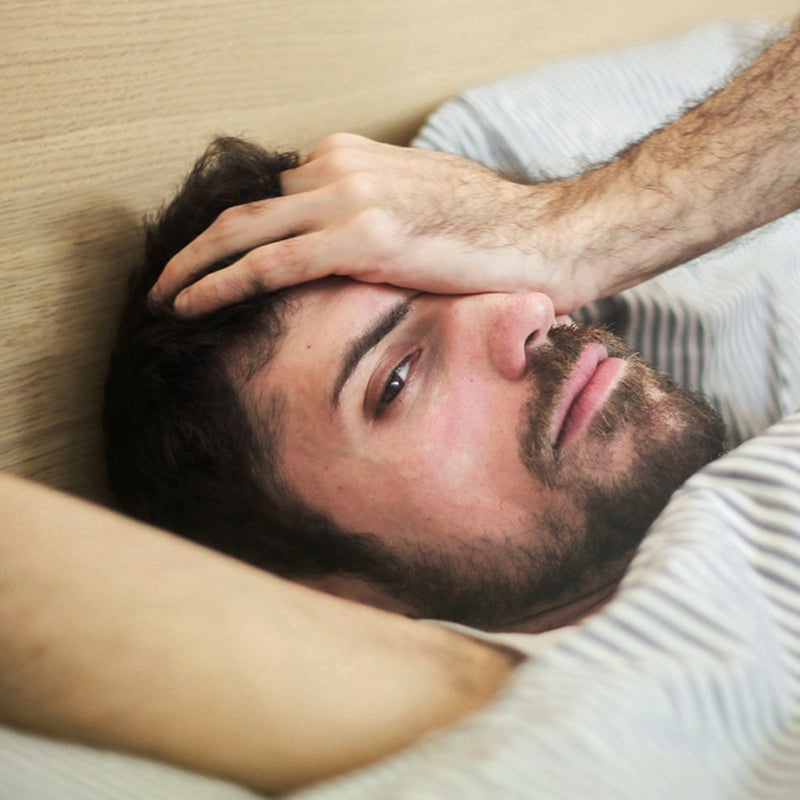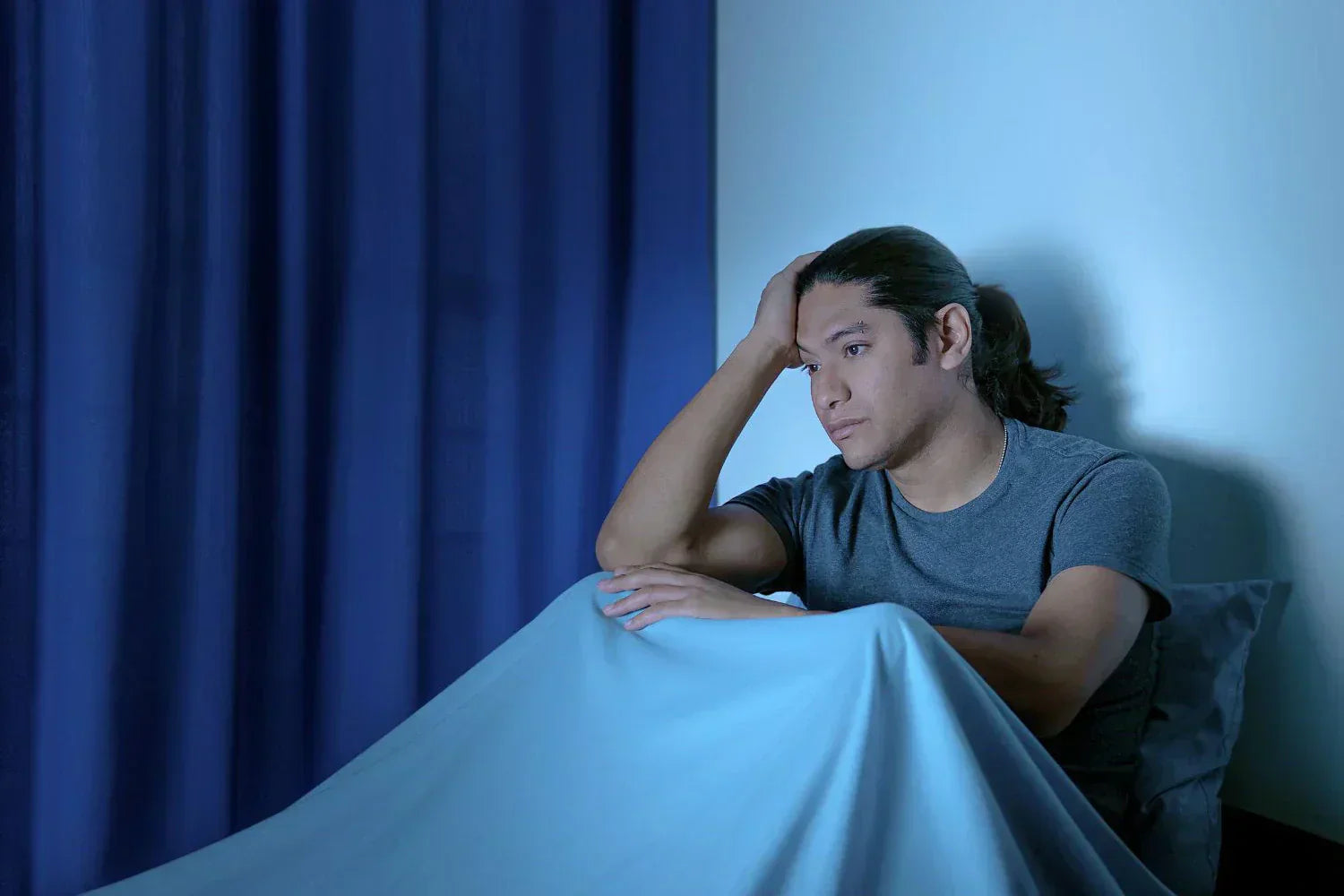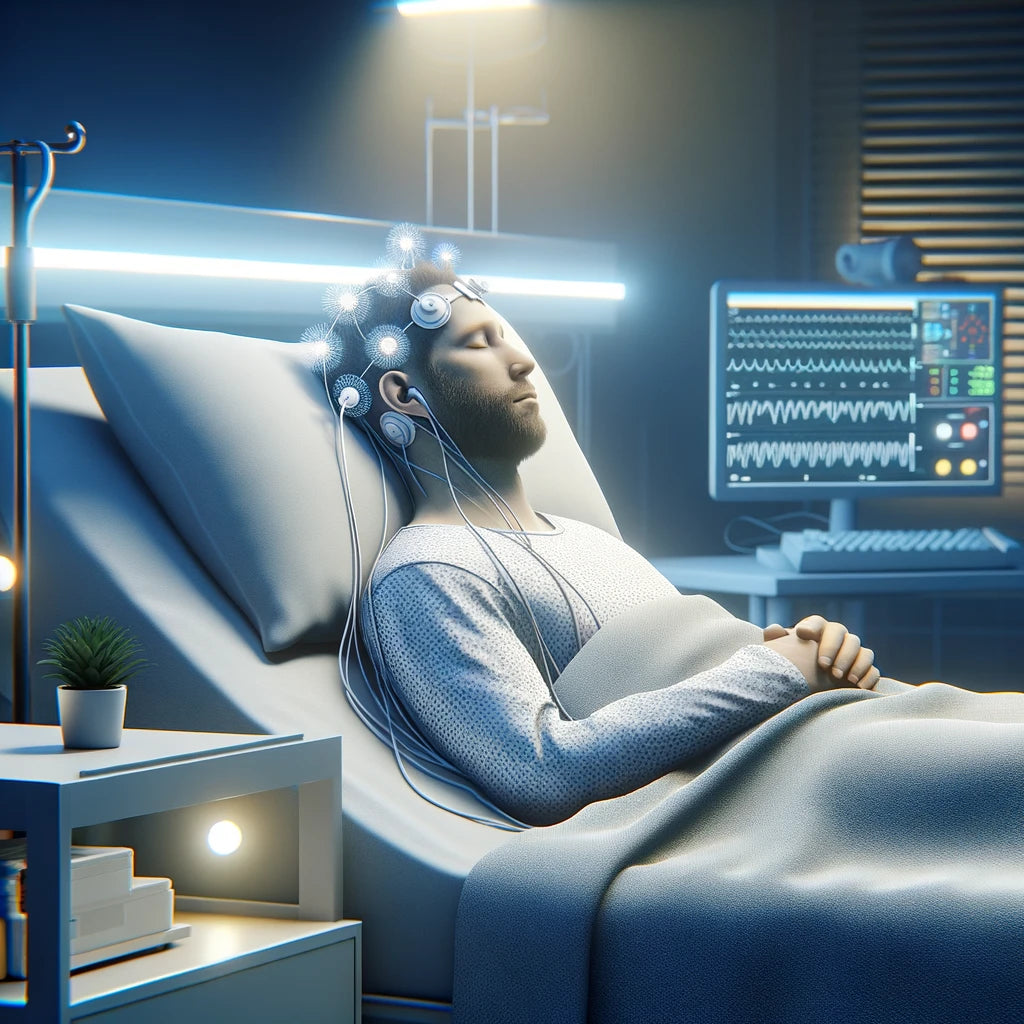Table of Contents
- What Is Anxiety?
- Understanding the Impact of Anxiety Disorders
- Exploring Anxiety Disorders: Types and Causes
- What Triggers Anxiety Disorders?
- The Complex Link Between Anxiety and Sleep
- Strategies for Overcoming Anxiety-Induced Sleep Challenges
- Unraveling Nighttime Anxiety: Causes, Symptoms, and Impact
- When to See a Doctor
Understanding the Link Between Anxiety and Sleep
Struggling with anxiety at bedtime is a common issue that can stem from stress, anxiety disorders, or various health conditions. Effective remedies may include medication, adopting healthier lifestyle habits, or therapy, depending on the root cause. Anxiety, a normal emotional response, is marked by feelings of unease and apprehension. It often persists due to prolonged stress, occasionally without a clear reason.

Situations like a first date or job interview can trigger anxiety, but when these feelings of concern don't fade and disrupt your sleep, it could signal an anxiety disorder. Discover the potential triggers of nighttime anxiety and strategies for alleviation below:
- Anxiety can significantly affect sleep quality, leading to a cycle of increased anxiety symptoms due to sleep deficiency.
- Various anxiety disorders can differently affect individuals and their sleep patterns.
- Nighttime anxiety may prevent you from falling asleep, creating a vicious cycle of insomnia, stress, and worry.
- Implementing proper sleep hygiene and seeking professional guidance are crucial steps in managing sleep disturbances linked to anxiety.
Anxiety and sleep issues are closely interwoven. Excessive worry and fear complicate the process of falling and staying asleep, while lack of sleep can intensify anxiety, fueling a harmful loop of insomnia and anxiety disorders. Anxiety disorders are prevalent mental health concerns in the United States, with sleep deprivation known to negatively affect overall health significantly. Thus, recognizing and tackling the intricate relationship between anxiety and sleep is vital for enhancing both physical and emotional health.
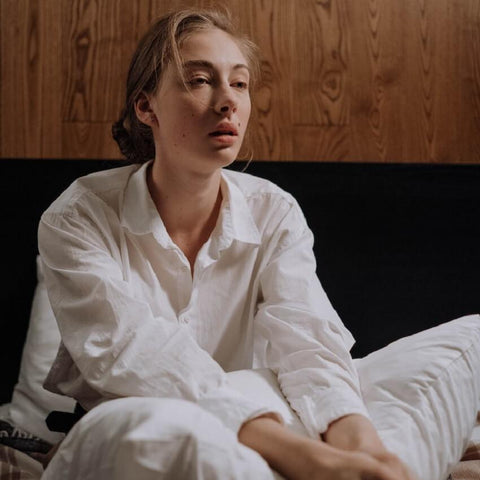
What Is Anxiety?
Anxiety encompasses feelings of worry and discomfort, a natural response to stress or fear-inducing situations. While occasional anxiety is typical, anxiety disorders, as detailed by the National Institute of Mental Health (NIMH), represent a more severe form where the anxiety is disproportionate to the actual circumstances. This heightened state of worry disrupts daily life, with persistent symptoms lasting for six months or more. Understanding the distinction between normal anxiety and anxiety disorders is crucial for identifying and seeking appropriate treatment.
Understanding the Impact of Anxiety Disorders
Anxiety disorders manifest through a combination of emotional and physical symptoms, deeply affecting individuals. Those experiencing anxiety might find themselves constantly nervous, struggling with concentration, and battling feelings of irritability or restlessness. Physical signs include muscle tension, accelerated heart rate, excessive sweating, and gastrointestinal issues, among others. The fear of potential triggers can lead individuals to avoid certain situations, impacting their personal and professional lives without addressing the root cause of their anxiety.
Despite these challenges, the intensity of anxiety disorders varies among individuals. According to a survey by the National Institute of Mental Health (NIMH), about 43% of adults report mild disruption to their daily lives due to anxiety, while 33% experience moderate effects. Nearly a quarter of respondents describe their anxiety as severe, highlighting the diverse ways anxiety can influence one's quality of life. This variability underscores the importance of recognizing and treating anxiety disorders to improve overall well-being.
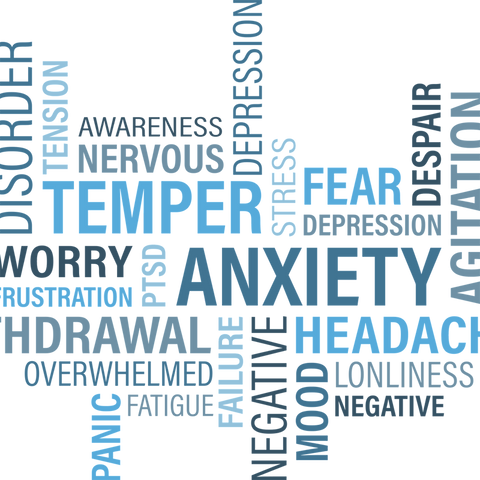
Exploring Anxiety Disorders: Types and Causes
Anxiety disorders encompass a range of conditions that share anxiety as a central symptom, though not all fall strictly within this category. Understanding these disorders is crucial for recognizing and addressing the varied experiences of those affected.
- Generalized Anxiety Disorder (GAD) is characterized by pervasive worries about numerous aspects of life, leading to a continuous feeling of anxiety.
- Panic Disorder involves sudden, intense episodes of fear or panic attacks that are brief yet overwhelming.
- Social Anxiety Disorder presents as an acute fear of social interactions and the potential for embarrassment in public settings.
- Specific Phobias trigger severe fear responses to particular situations or objects, including common fears like agoraphobia (fear of open or crowded spaces) and separation anxiety.
- Obsessive-Compulsive Disorder (OCD) is marked by persistent, intrusive thoughts (obsessions) that lead to repetitive behaviors (compulsions) aimed at managing anxiety.
- Post-traumatic Stress Disorder (PTSD) can develop following exposure to traumatic events, causing individuals to relive the trauma, feel constantly on edge, and experience significant anxiety.
What Triggers Anxiety Disorders?
Affecting approximately 20% of American adults, anxiety disorders are the most prevalent mental health condition in the United States, as noted by NIH News in Health. The root causes of anxiety are complex and multifaceted, including genetic predispositions, family history, and the impact of stressful or negative life experiences. Certain medical conditions and medications can also exacerbate anxiety symptoms.
Interestingly, anxiety disorders often coexist with other mental health issues, such as depression. The Anxiety and Depression Association of America (ADAA) highlights that nearly half of those diagnosed with depression also battle an anxiety disorder. This overlap suggests a need for comprehensive approaches to treatment and support.
The interplay of genetic, environmental, and psychological factors contributes to the development of anxiety disorders. Despite the challenges in pinpointing a single cause, understanding the combination of influences can aid in better diagnosis, treatment, and support strategies for those affected. This multifaceted perspective is essential for addressing the diverse needs of individuals with anxiety disorders, aiming to improve their quality of life and overall well-being.
The Complex Link Between Anxiety and Sleep

The interplay between anxiety and sleep disorders illustrates a complex, bidirectional relationship, where each can significantly exacerbate the other. Anxiety disorders often arise from a blend of genetic predispositions and environmental factors, including stress, trauma, and certain lifestyle choices. Prescription medications, substance abuse, and medical conditions such as heart disease, hyperthyroidism, and chronic pain also play a role in triggering anxiety symptoms.
This dynamic is further complicated by the reciprocal nature of anxiety and sleep disturbances. Anxiety can disrupt sleep patterns, leading to a cycle of worry and mental hyperarousal that makes restful sleep elusive. Conversely, insufficient sleep can trigger or intensify anxiety, creating a self-perpetuating cycle. The impact of anxiety on sleep is especially notable in individuals with disorders like GAD, OCD, and PTSD, who experience greater sleep reactivity and are more vulnerable to sleep disturbances in response to stress. Reports indicate that over 90% of individuals with PTSD, particularly those related to military combat, suffer from insomnia, underlining the profound effect of anxiety on sleep quality.
Research underscores the prevalence of sleep issues among those with anxiety disorders, with surveys showing that 24% to 36% of people with sleep disturbances also battle anxiety. The situation is even more dire for individuals with panic disorder, who are three times more likely to suffer from sleep problems. A significant study in 2016 shed light on the potential of Cognitive Behavioral Therapy (CBT) to improve sleep quality and reduce the time it takes to fall asleep in those with anxiety, suggesting that targeting sleep issues during anxiety treatment could be beneficial.
The presence of conditions like obstructive sleep apnea (OSA) further complicates the relationship, as it's associated with an increased risk of mental health problems, including anxiety and depression. This highlights the necessity of addressing sleep disorders within the context of anxiety treatment to manage these interconnected challenges effectively.
In sum, understanding and addressing the nuanced relationship between anxiety and sleep is critical for improving the overall quality of life. Integrating sleep management into anxiety treatment offers a holistic approach, emphasizing the importance of comprehensive strategies to tackle these intertwined health concerns.
Unraveling Nighttime Anxiety: Causes, Symptoms, and Impact
Nighttime exacerbates anxiety for many, creating a cycle where sleep deprivation and mental health issues reinforce each other. Research indicates that lack of sleep can both trigger and amplify anxiety, and those with mental health conditions, including anxiety, are more prone to experiencing poor sleep. Addressing both nighttime anxiety and sleep disturbances is crucial for enhancing overall well-being.
Nighttime Anxiety and Its Unique Challenges
Nighttime can trigger specific anxiety symptoms, such as nocturnal panic attacks, which occur during sleep with the same intensity as daytime attacks. Approximately 20% to 45% of individuals with panic disorder report experiencing these disruptive nighttime episodes, complicating their ability to relax and sleep again.
For some, this nighttime anxiety evolves into insomnia, a condition characterized by persistent difficulties in falling or staying asleep. Chronic insomnia not only deteriorates one’s quality of life but also increases the risk of several health issues, including cardiovascular problems, weakened immunity, mental health disorders like depression, and a higher likelihood of accidents.
Takeaway
The interplay between anxiety and sleep is complex, with nighttime often becoming a peak period for anxiety symptoms to intensify. Understanding this relationship is key to seeking effective treatments and interventions, aiming to break the cycle of anxiety and sleep disturbances. Implementing strategies for managing anxiety and improving sleep hygiene can significantly contribute to better mental and physical health outcomes.
Navigating Anxiety and Sleep
Finding the right treatment for anxiety is a journey that may involve trying various methods under the guidance of a healthcare provider. Effective approaches include:
- Addressing underlying health conditions.
- Participating in psychotherapy, notably Cognitive Behavioral Therapy (CBT), renowned for its effectiveness in managing anxiety.
- Taking anti-anxiety medications, such as benzodiazepines or antidepressants, to alleviate symptoms.
- Exploring herbal supplements like saffron, kava, ginseng, or lavender, known to help reduce anxiety. It's essential to consult with a doctor before starting any supplements, as their quality is not regulated as strictly as pharmaceuticals, and they may interact with other medications.
Lifestyle Tips for Reducing Nighttime Anxiety
To ease anxiety and improve sleep, consider these lifestyle modifications:
Meditation:
Engaging in mindfulness meditation can significantly lower anxiety levels, with immediate benefits and even more pronounced effects over time. Practicing meditation before bed can help quieten the mind, making it easier to fall asleep.
Deep Breathing:
This simple technique can have a profound impact on reducing anxiety and stress. Deep breathing helps slow down the heart rate and lower blood pressure, providing relief during moments of panic or stress at night.
Grounding Exercises:
Anxiety can sometimes lead to feelings of dissociation. Grounding techniques, which involve cognitive and sensory awareness practices like touching an object or vocalizing the current date, can help maintain connection to the present moment, easing the transition into sleep.
Incorporating these practices into your evening routine can significantly mitigate the effects of anxiety on sleep, enhancing relaxation and improving overall sleep quality. By addressing both the mental and physical facets of anxiety, these strategies offer a holistic approach to achieving better sleep and managing anxiety effectively.
Strategies for Overcoming Anxiety-Induced Sleep Challenges
Navigating sleep difficulties caused by anxiety is a common challenge, yet anxiety disorders remain among the most treatable mental health issues. Individuals facing ongoing or severe anxiety and sleep disruptions are encouraged to consult a healthcare professional. Such consultations can provide a comprehensive assessment and guide the exploration of treatment options, weighing their benefits and potential drawbacks.

Cognitive Behavioral Therapy (CBT) stands out as a highly effective approach for managing anxiety disorders. This form of talk therapy aims to transform negative thought patterns, demonstrating significant success in reducing anxiety symptoms. Research, including findings from the National Library of Medicine, supports CBT's efficacy in alleviating anxiety even among those suffering from insomnia. While CBT can facilitate improved sleep, some individuals may continue to experience insomnia, prompting consideration of CBT for insomnia (CBT-I) as a subsequent strategy.
Treatment for anxiety disorders may also encompass various medications, such as anti-anxiety drugs, antidepressants, and beta-blockers. These are primarily designed to alleviate symptoms, offering a temporary respite rather than a cure for anxiety itself.
Enhancing sleep quality can serve as a powerful countermeasure to anxiety. Establishing a conducive sleep environment and routine, prioritizing comfort in the bedroom, minimizing sleep disturbances from light and noise, and avoiding stimulants like caffeine and alcohol in the evening, can collectively foster a more restful night's sleep.
Implementing relaxation techniques can further aid in dispelling anxiety and promoting easeful sleep. These techniques, often integral to CBT, can interrupt the cycle of worry and obsessive thinking. Allocating specific times for worry outside of bedtime, practicing deep breathing, engaging in mindfulness meditation, and exploring guided imagery are among the methods that can help soothe the mind before sleep or upon nighttime awakenings.

Adopting these strategies can significantly improve the ability to fall asleep amidst anxiety, offering a pathway to both mental and physical rest.
If your anxiety often flares up at night due to concerns about daily tasks, crafting a to-do list for the upcoming day or week can significantly alleviate this stress, allowing your mind to rest easier. Beyond this, cultivating healthy sleep habits plays a pivotal role in mitigating nighttime anxiety and boosting sleep quality. Feeling at ease in your bedroom environment is crucial for improving sleep.
Sleep To-do's
Here are several strategies to foster good sleep hygiene, enhancing both the quality and duration of your rest:
Daily Exercise:
Regular physical activity has been shown to not only enhance sleep quality and length but also positively affect anxiety levels. Morning exercises might extend your nighttime sleep, while afternoon sessions also offer benefits. However, intense workouts right before bedtime could hinder the ease of falling asleep due to increased body temperature and heart rate. The key is finding a balanced exercise routine that suits your lifestyle.
Consistent Sleep Schedule:
Aligning with your body's circadian rhythm by maintaining a regular sleep and wake schedule facilitates easier sleep initiation at night. Consistency helps regulate your internal clock, contributing to better sleep patterns.
Avoiding Stimulants Before Bed:
Consuming stimulants such as caffeine can exacerbate anxiety symptoms and impede the ability to fall asleep due to their energizing effects. Similarly, alcohol, despite not being a stimulant, can disrupt sleep quality, so it's best to avoid it in the hours leading up to bedtime.
Limiting Electronic Device Use:
The blue light emitted by screens can suppress melatonin production, the hormone responsible for sleep, thus extending the time it takes to fall asleep. A study in 2017 involving nearly 350 adults indicated a direct correlation between post-bedtime electronic use and increased sleep onset time, highlighting the importance of reducing screen time before bed.
Optimizing Bedroom Comfort:
Ensure your sleeping arrangements — including pillows and mattresses — are comfortable and supportive, tailored to your sleeping preferences. Personalizing your bedroom to be a tranquil, inviting space is fundamental in creating an optimal environment for easing nighttime anxiety.
Implementing these practices into your nightly routine can profoundly impact your ability to manage anxiety and improve overall sleep quality. By addressing the factors that contribute to sleep disturbances, you can create a more serene and restorative nighttime experience.
If you find your anxiety intensifying at night, leading to sleep disturbances that impact your daily life and performance at work or school, it's crucial to seek professional help. Persistent anxiety and sleep issues can significantly diminish your quality of life, making routine tasks challenging.
When to See a Doctor
Consulting a doctor or mental health specialist is a vital step toward managing your symptoms. A professional can diagnose the issue, whether it's anxiety, insomnia, or a combination of both, and guide you toward appropriate treatment options.
Remember, numerous factors, including daily stress, unhealthy sleep habits, and various health conditions, can exacerbate nighttime anxiety and trigger panic attacks. Fortunately, a range of treatments exists to alleviate anxiety and enhance sleep quality. If nighttime anxiety and sleeplessness are hindering your life, accessing mental health resources can make a profound difference. It's never too late to seek the support you need to improve your wellbeing.

